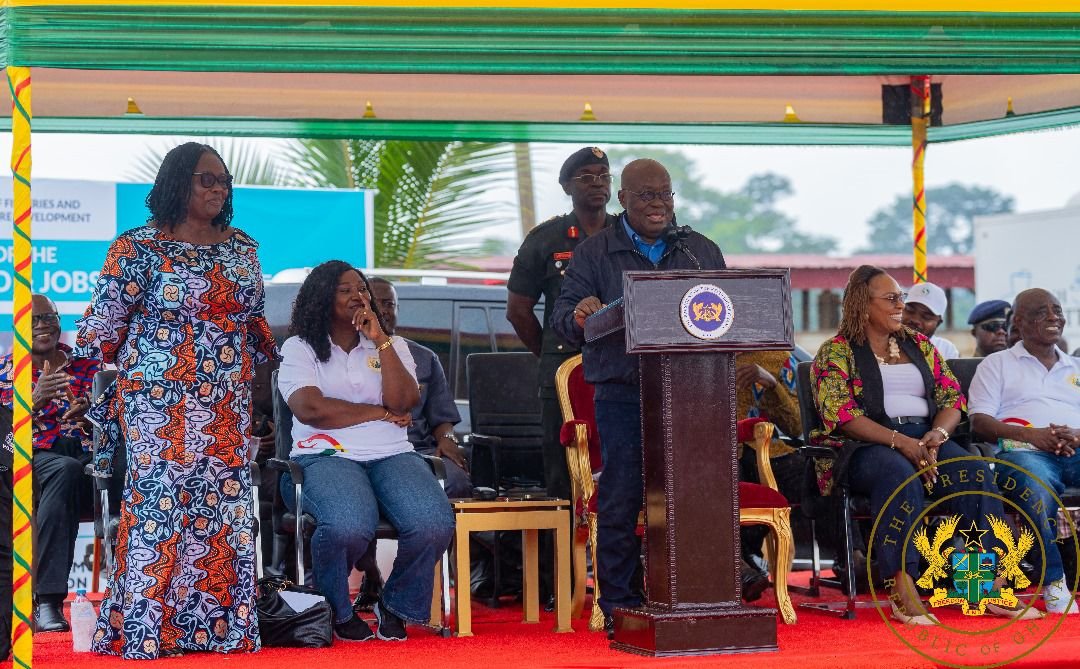News
President Akufo-Addo Launches ‘Aquaculture For Food And Jobs’ Programme: A new dawn for Ghana’s agricultural sector

In a groundbreaking event held on Tuesday, July 30, 2024, at Nsuaem in the Central Region, President Nana Addo Dankwa Akufo-Addo unveiled the Aquaculture for Food and Jobs Programme.
Acknowledging the efforts of the Minister for Fisheries and Aquaculture Development, Hon. Mrs. Mavis Hawa Koomson, President Akufo-Addo praised her dedication and hands-on approach.
Her leadership has been instrumental in developing this project and implementing decisive initiatives such as the annual close season for fishing, which has restored fish stocks and promoted aquaculture as a viable economic sector.
President Akufo-Addo extended his gratitude to all partners, stakeholders, and dedicated teams working to make this project a reality, emphasizing the importance of collaboration in revolutionizing aquaculture in Ghana.
President Akufo-Addo emphasized the immense potential of aquaculture, stating that the sector is a critical component of the global food system.
As the programme was officially launched, President Akufo-Addo called on all Ghanaians to support this initiative, which promises to build a stronger, healthier, and more prosperous nation. “May God bless us all, and our homeland Ghana, and make her great and strong,” he concluded, marking the beginning of a new era in Ghana’s agricultural sector.
This initiative is a testament to the government’s commitment to sustainable development, food security, and job creation.
It marks a significant milestone in the nation’s agricultural sector, aiming to harness Ghana’s abundant water resources to provide sustainable livelihoods and enhance nutritional standards.
Aquaculture currently provides nearly half of the world’s fish supply, a figure that continues to grow as wild fish stocks diminish due to overfishing and environmental changes.
In Ghana, fish is a dietary staple, significantly contributing to the nation’s nutritional intake. However, the domestic supply falls short of the demand, resulting in substantial imports that strain the country’s foreign exchange reserves.
In 2022, Ghana’s fish requirement stood at 1.31 million metric tonnes, while domestic production was only 657,000 tonnes.
This shortfall necessitated the importation of 650,000 tonnes of fish, costing $311 million.
The Aquaculture for Food and Jobs Programme aims to bridge this gap by boosting local fish production, thereby reducing dependence on imports, conserving foreign exchange, and ensuring the availability of fresh, domestically-produced fish.
The programme’s impact extends beyond increasing fish production. It is poised to transform lives by creating thousands of jobs, particularly for the youth and women.
The initiative will provide training and support to aspiring fish farmers, equipping them with the skills and resources necessary for success.
It will also foster a network of fish farms across the country, enhancing Ghana’s capacity to meet the growing demand for fish and stimulating the development of related industries such as fish feed production, processing, and marketing.
By making fish more accessible and affordable, the programme will combat malnutrition and improve public health. Fish is a rich source of essential nutrients, and increasing its availability will significantly contribute to the nation’s nutritional standards.
This initiative is not only an economic driver but also a vital component in the fight against malnutrition.
The programme is being launched in partnership with R&B Farms Ltd., the largest inland fish farm in Ghana, operating on 26 hectares of land in Gomoa Central. Under this project, the government aims to train 10,000 youth in small-scale fish farming.
The ripple effect of this initiative is expected to generate an additional 50,000 jobs along the aquaculture value chain, encompassing fish feed production, equipment supply, fish processing, marketing, and distribution.
President Akufo-Addo called on private investors to seize the opportunities presented by this programme, highlighting the substantial market for fish and fish products.
With the right investments, the aquaculture sector can be transformed into a major economic driver.
Research institutions and universities will play a crucial role in providing the knowledge and technological innovations needed to enhance productivity and sustainability.
Under this programme, the government will provide youth with training and skills development in fish farming.
They will receive tarpaulin cages, fingerlings, and fish feed as seed capital, enabling them to start profitable fish farming businesses within six months.
The launch of the Aquaculture for Food and Jobs Programme signifies a bold step towards a brighter future for Ghanaian youth and women.
It aims to meet fish consumption needs, reduce import dependency, and provide meaningful employment.
Entertainment
Kwaisey Pee honours promise, donates GHC50,000 to Korle-Bu Paediatric Oncology Unit

Ghanaian music icon, Akwasi Poku Addae, known in Showbiz circles as Kwaisey Pee has honoured his promise to children suffering from cancer.
Ahead of his 25th anniversary event held at the D’ Icon Event Centre at East Legon last year, he made a promise to donate some funds to children suffering from cancer.
True to his word, the musician has recently made a donation of GHC50,000 to the Paediatric Oncology Unit of the Korle-Bu Teaching Hospital.
He told the Ghanaian Times that children are so dear to him, and was optimistic the support would go a long way too impact lives.
The music dynamo also promised that the gesture will not be the last,” it will be a continuous feature from me.”
He also called on Ghanaians home and abroad to lend a helping hand to children suffering from cancer.
According to him, children with cancer have many needs, and a helping hands will go a long way ease the suffering.
“Cancer treatment is very expensive, and leaving that to parents of the children alone, will be a huge burden, with support from you and myself, we can make some changes in other people’s lives,” he concluded.
By Edem Mensah-Tsotorme
News
Dickson Kyere Duah, Kwadwo Poku clash over government funding for World Cup participation

A disagreement has emerged between Member of Parliament for Berekum West, Dickson Kyere-Duah, and energy consultant Kwadwo Poku over government funding for Ghana’s participation in the 2026 FIFA World Cup.
The debate centred on government’s decision to budget about 13 million dollars to support the national team, even though FIFA is expected to provide an appearance fee of about 10.5 million dollars if Ghana qualifies for the tournament.
During the discussion on Joys news , Mr Poku questioned why the government should allocate such an amount when FIFA already provides funds to participating countries.
According to him, the appearance fee alone should help cover some of the country’s expenses.
He argued that if FIFA is giving Ghana 10.5 million dollars simply for qualifying for the tournament, it raises questions about the need for the government to appropriate additional funds.
Mr Kyere Duah, however, explained that the government’s allocation was part of advance planning captured in the national budget even before the final qualification results were known.
He noted that the budget for the tournament period was prepared in November 2025, when it was not certain that Ghana would qualify.
He stressed that budgeting does not automatically mean the entire amount will be spent.
According to him, the funds are meant to prepare the team from the start of the competition period until the end of the tournament.
Mr Kyere Duah explained that if the team exits the tournament early, the full amount allocated in the budget will not be used.
Mr Poku maintained that FIFA already provides financial support to teams for participating in the World Cup and insisted that the government must clearly justify additional spending.
The discussion extended to the role of the Ghana Football Association in managing the national teams.
Mr Poku described the association as a private institution and argued that FIFA also operates as a private body that does not allow government interference.
He explained that FIFA provides funds to teams to support their preparation and participation in the tournament.
Mr Kyere Duah, however, maintained that national teams represent the country and require government support to operate effectively.
By: Jacob Aggrey

 News1 week ago
News1 week agoFinance Minister outlines new gold policies to boost reserves and curb smuggling

 News1 week ago
News1 week agoSam George launches the 2026 Meteorological Awareness Month; presents the 2026 seasonal forecast for southern Ghana

 Hot!1 week ago
Hot!1 week agoBreaking: Footballer who killed two children in Abesim handed lifetime sentence














